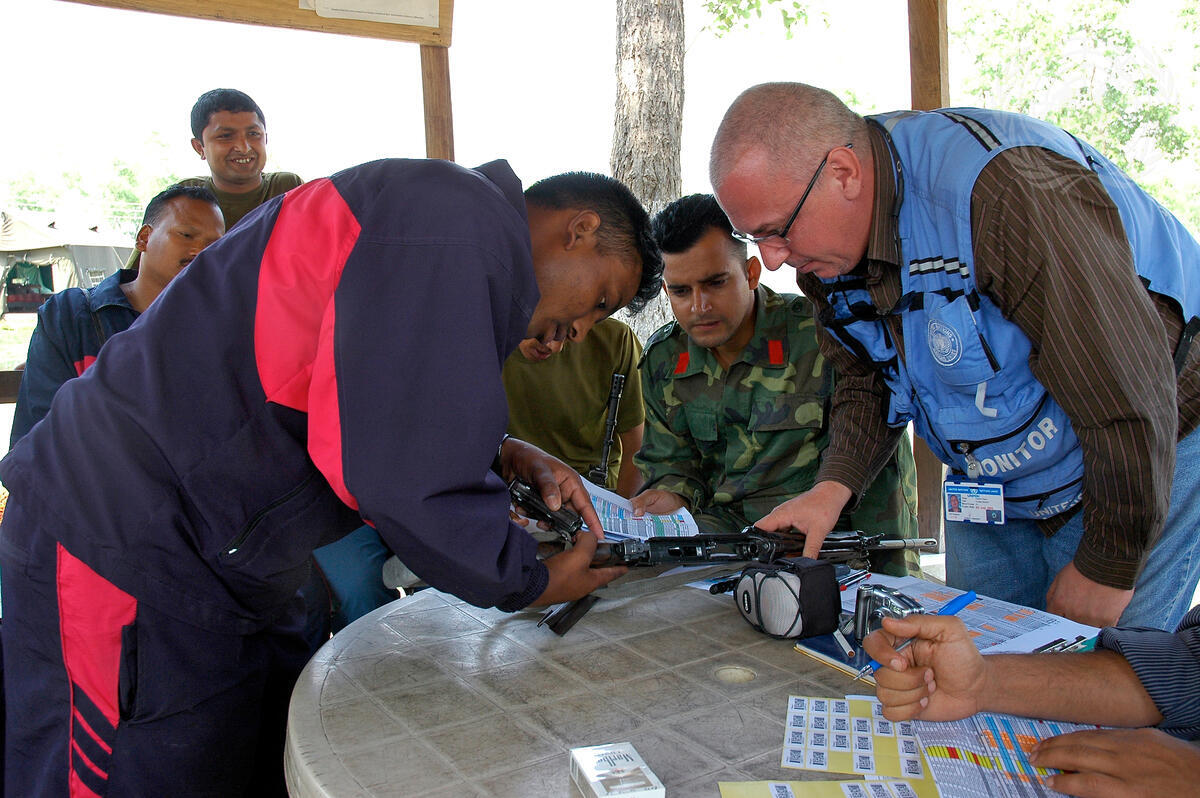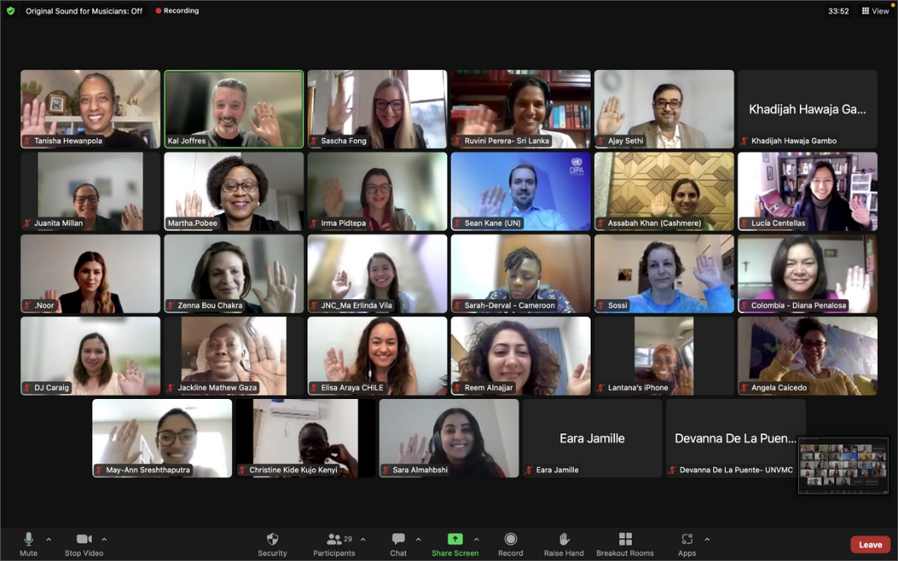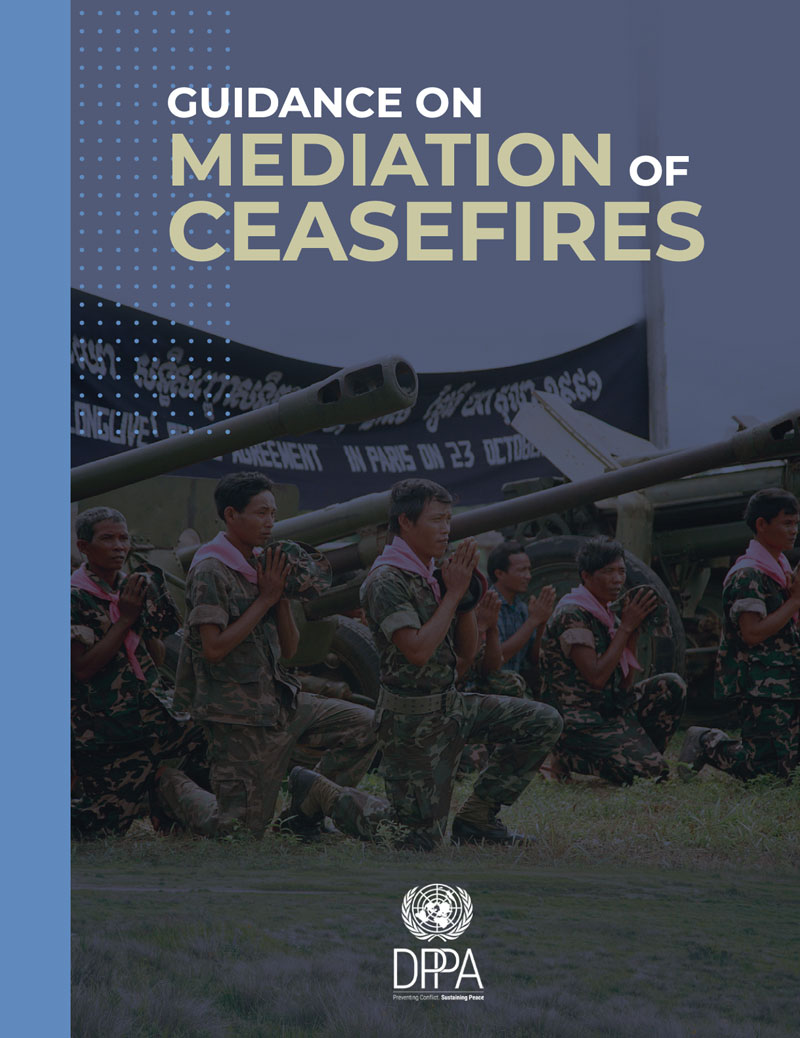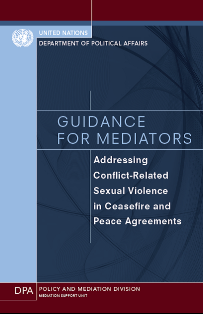Los acuerdos y mecanismos para detener o gestionar la violencia siguen siendo un componente ineludible de los procesos de paz para poner fin a los conflictos armados. El cese al fuego suele ser una de las primeras cuestiones que las partes beligerantes tratan de negociar, y en las guerras civiles puede ser la base para unas conversaciones de paz inclusivas y globales. En los lugares donde aún no es posible entablar conversaciones globales, los cese al fuego parciales, temporales, locales o por razones humanitarias pueden contribuir a desescalar el conflicto y reducir la violencia.
Desde la resolución 50 del Consejo de Seguridad (1948), que pedía un cese de hostilidades en Palestina supervisado por las Naciones Unidas, la Organización ha participado en cientos de ceses al fuego. Sobre la base de esta profunda experiencia institucional, la DAM proporciona apoyo operativo y orientación estratégica, y organiza iniciativas de desarrollo de capacidades en materia de negociación o mediación de cese al fuego para una gran variedad de socios a escala mundial, incluidos altos funcionarios de las Naciones Unidas, Estados Miembros, organizaciones regionales y otros socios.
Apoyo operativo
La DAM responde a docenas de peticiones anuales de conocimientos técnicos específicos, apoyo operativo y asesoramiento sobre cese al fuego y acuerdos de seguridad de socios de la ONU y ajenos a ella. Los asesores superiores de la Dependencia de Apoyo a la Mediación y el mecanismo del Equipo de Reserva de Asesores Superiores sobre Mediación (incluidos los especialistas en cese al fuego que trabajan a tiempo parcial) prestan regularmente este apoyo tanto a los socios que forman parte de la ONU como a los que no.
Este apoyo operativo podría incluir, entre otras, las siguientes actividades:
- Revisión documental, análisis o asesoramiento técnico con respecto a un área temática específica de un cese al fuego. La DAM presta regularmente asesoramiento técnico a las misiones de la ONU con mandatos de negociación o asistencia en la aplicación de un acuerdo de cese al fuego, como en Colombia, Libia y Yemen;
- Despliegues a distancia o in situ para proporcionar resultados específicos relacionados con el diseño, la negociación o la gestión de un cese al fuego. En 2024, la DAM apoyó las conversaciones indirectas convocadas por el Enviado Personal del Secretario General para Sudán con el fin de estudiar medidas y opciones para garantizar la distribución de la ayuda humanitaria y la protección de la población civil en Sudán;
- Apoyo en la planificación y realización de talleres temáticos adaptados y sesiones de diálogo con las partes interesadas nacionales durante un proceso de cese al fuego. En 2023, la DAM ayudó a las misiones de supervisión y verificación de las Naciones Unidas en Colombia y Noruega a organizar talleres independientes para el Gobierno de Colombia y el Ejército de Liberación Nacional sobre la experiencia mundial en la negociación y gestión del cese al fuego.

Orientación estratégica
Los cese al fuego son tan antiguos como los conflictos armados. Cada uno de ellos es único y se inscribe en un contexto político, de seguridad, económico, social y humanitario más amplio. Un análisis cuidadoso de este contexto dinámico —y en particular de sus dimensiones políticas— puede ayudar a los mediadores a trabajar con las partes para diseñar un cese al fuego realista.
La DAM elabora documentos de orientación estratégica sobre cese al fuego y arreglos de seguridad para los altos cargos y el personal de las Naciones Unidas, mediadores y facilitadores, así como para socios externos. La emblemática "Guía para la mediación del cese al fuego", publicada por el DAPCP en 2022, fue la primera de su clase a escala mundial y pretendía ser una guía de referencia clave para las partes interesadas que buscan vías para salir de los conflictos armados.
Desarrollo de capacidades
Las negociaciones o mediaciones para alcanzar acuerdos de cese al fuego y arreglos de seguridad implican debates sobre una serie de cuestiones técnicas complejas. Las partes interesadas deben tener los conocimientos técnicos necesarios sobre los conceptos que les permitan presentar su visión y sus posturas de forma lógica y coherente. El desarrollo de capacidades también tiene como objetivo aumentar su aptitud para crear opciones más realistas y encontrar ámbitos comunes de acuerdo potencial.
Por ello, el DAPCP complementa sus actividades operativas con un ambicioso planteamiento global de desarrollo de las capacidades del personal de la ONU, de los socios en el establecimiento de la paz y de las partes en conflicto. Desde 2012, el DAPCP imparte conjuntamente con Noruega y Suiza el curso anual de mediación del cese al fuego de las Naciones Unidas. Aunque está abierto al personal de la ONU, este curso se dirige de forma especial a representantes de las partes gubernamentales y no estatales en conflicto. En reconocimiento de que son necesarios esfuerzos adicionales específicos para superar los obstáculos a la participación de las mujeres en los cese al fuego, el DAPCP puso en marcha en 2021 un curso en línea sobre las mujeres en las negociaciones de cese al fuego (WiCC, por sus siglas en inglés) que pone el foco en las mujeres de entornos en conflicto.
En colaboración con sus socios, la DAM también desarrolla talleres temáticos a medida y sesiones de diálogo con las partes interesadas nacionales durante un proceso de cese al fuego.
 Foto de la ONU/Agnieszka Mikulska
Foto de la ONU/Agnieszka Mikulska
Curso anual de mediación del cese al fuego de la ONU en Oslo (Noruega)
La DAM imparte anualmente el curso de mediación del cese al fuego de las Naciones Unidas. Esta formación se imparte en colaboración con el Centro Internacional de Defensa de Noruega, el Ministerio de Asuntos Exteriores de Noruega y el Departamento Federal de Asuntos Exteriores de Suiza.
A la formación asisten funcionarios de nivel medio y superior de las Naciones Unidas y sus socios que trabajan actualmente en entornos en los que se está mediando o existe ya un acuerdo de cese al fuego y que participan directamente en el desarrollo, el apoyo o la gestión de tal acuerdo. Además del personal de la ONU que trabaja sobre el terreno y en la sede, también asisten a la formación representantes seleccionados de Estados miembros, organizaciones regionales o subregionales y partes en conflicto, que aportan al curso perspectivas realistas y experiencias enriquecedoras.
Curso anual en línea de las Naciones Unidas sobre las mujeres y el cese al fuego
En todo el mundo, las mujeres siguen estando muy poco representadas como participantes directas en las negociaciones y la aplicación de los acuerdos de cese al fuego. Este curso en línea ampliado pretende aumentar el número de mujeres con los conocimientos técnicos necesarios para participar en las negociaciones y la aplicación de acuerdos de cese al fuego y arreglos de seguridad. Se celebra una vez al año con aproximadamente 30-35 mujeres de diversos contextos de todo el mundo. El curso se imparte en cumplimiento del compromiso del DAPCP con la aplicación de la agenda sobre las mujeres, la paz y la seguridad (MPS), en particular con el fin de apoyar la participación plena, igualitaria y significativa de las mujeres en los esfuerzos de paz y fortalecer la receptividad de los arreglos de seguridad a las cuestiones de género. Para cualquier consulta, puede escribir a la dirección de correo electrónico women-in-ceasefires@un.org.






